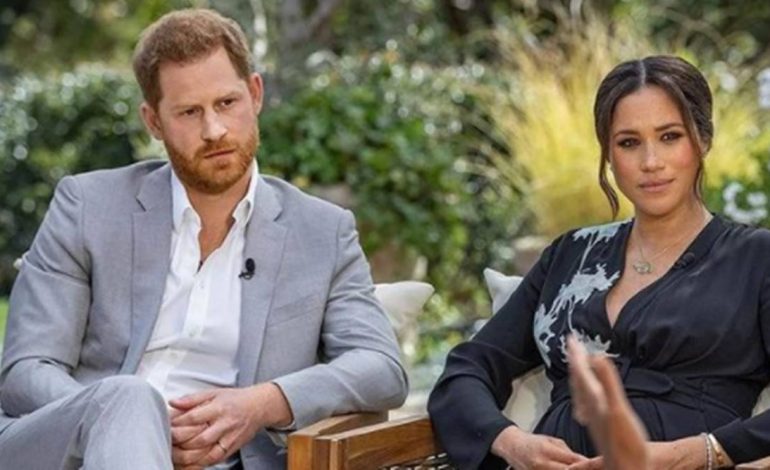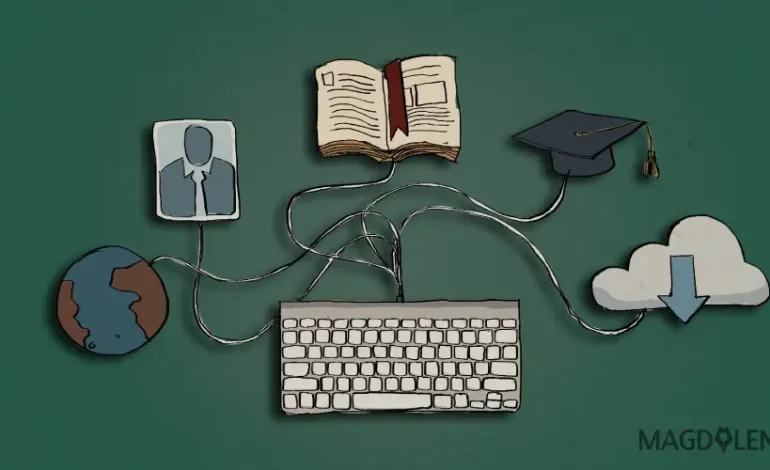I’m Part Brit and Meghan Markle’s Interview Doesn’t Shock Me

About 12.4 million viewers in Britain sat down to watch the Meghan Markle and Oprah interview on ITV this week, my mum, brother and I were amongst them. Since moving back to the UK, I have mostly steered away from “the telly”, but this interview seemed irresistible, especially considering the internet (and Indonesian netizens) has been going crazy in the run up to it.
Sat in true British fashion, as a family on the sofa, cup of tea in hand (albeit the non-traditional Genmaicha in this case), we watched in near silence, and trust when I tell you, us Al Rashids don’t tend to watch things in silence. We are animated TV watchers, we hurl, we laugh out loud, or our favourite of late has been imitating the buffoonery of Boris Johnson during his televised speeches, and straight up venting about the ridiculousness of his cabinet and their Covid policies. But this time around, during this interview, we were captivated into absolute silence and seriousness.
I should disclose that I’ve always felt indifferent to Meghan Markle, mainly because I’m pretty apathetic to the royal family in general to be honest, except for Princess Di—she was the only likeable royal and indeed the queen of our hearts.

The truths dropped by Meghan in this interview, especially pertaining to the issue of race, I guess could appear shocking to those who have not spent time in the UK, but for those of us who have lived in Britain as non-white citizens, the racism that Meghan expresses in the interview does not come as a surprise. Structural racism has always existed in this country.
And before any Indonesian reading this raises their eyebrows at me and say “But, Hannah, you look white, you ARE white”, let me explain that being half white in Indonesia, and half white in the UK mean two very different things.
It’s only in Indonesia that I have always had my “whiteness” pointed out to me. But in the UK, my experiences have always been as someone of an ethnic minority, I’ve been mistaken for Palestinian, Latina, Turkish, Pakistani, half Asian, but trust me, never Caucasian, and with a surname like Al Rashid, it’s pretty clear what box I am put in to, especially post 9/11.
Also read: Why You Need to Educate Yourself about White Privilege

White Superiority and Inherent Racism
Reni Eddo Lodge summed up the British experience on speaking up about racism perfectly in her book Why I’m No Longer Talking to White People about Race: “Not all white people, just the vast majority who refuse to accept the legitimacy of structural racism and its symptoms. I can no longer engage with the gulf of an emotional disconnect that white people display when a person of colour articulates their experience. You can see their eyes shut down and harden. It’s like treacle is poured into their ears, blocking up their ear canals. It’s like they no longer hear us.”
If this isn’t a quote to perfectly encapsulate Piers Morgan’s reaction to being called out on his own damn show, in the wake of this Oprah interview, then I don’t know what is.
Akala, in his book Natives: Race and Class in the Ruins of Empire, dedicates an entire chapter to this problem of denial and ‘A Very British Brand of Racism’ which he describes as “polite denial, quiet amusement or outright outrage that one could dare to suggest that the mother of liberty is not a total meritocracy after all, that we too, like so many ‘less civilised’ nations around the world, have a caste system.”
Schools never teach about the British Empire or Britain’s complicity in the slave trade, or about Partition, or any other historical event in which the British inflicted pain on others through the imposition of their white superiority and inherent racism.
As someone who went through the British education system, I can tell you, I was never taught about the British Empire or Britain’s complicity in the slave trade, or about Partition, or any other historical event in which the British inflicted pain on others through the imposition of their white superiority and inherent racism, the foundations on which their “great” empire were built. I wasn’t taught about these things, and I didn’t know what systemic racism meant, but as a kid I knew what it looked like.
It looked like my best friend from Ghana being targeted and bullied as one of the only black girls in our private school—by our headmistress of all people. It also looked like my brother using the name Ivan instead or Irfan when speaking to clients on the phone at work, because ethnic names “don’t bring in the money.” And it continued with hijab wearing friends not feeling safe post 9/11, or male Arab friends being racially profiled and harassed by police weekly, or me having to sit in an Uber for 40 mins with a driver who started a discussion with “you hear what these bloody Muslims have been up to on the news then?” unaware that I was Muslim, because luckily the name on the Uber order was not Al Rashid, but the surname a friend who ordered the ride for me.
Also read: When Women of Color Support Brett Kavanaugh

Racism, Islamophobia and Anti-Immigrant Sentiment
The British media have continued to fuel islamophobia, racism and anti-immigrant sentiment for years, particularly noticeable in the run up to the referendum to leave the EU, with exaggerated headlines implying that immigrants are rapists, criminals and murderers and that the “invasion” of these foreigners will be the downfall of the country.
There has been a stark increase in discrimination and abuse since the Brexit Referendum, a survey highlighted in a Guardian article, showed that 71 percent of people from ethnic minorities reported having faced racial discrimination in early 2019, compared with 58 percent in January 2016, before the EU vote.
Our politicians are also complicit in fuelling racist sentiment and dismissing the voices of people of colour who speak out against it. Boris Johnson has said Muslim women who wear burqas look like “letterboxes” and “bank robbers”, and has used the extremely offensive term “piccannines” to describe black children of the commonwealth.
Home Secretary Priti Patel, said in an interview that she thought the Black Lives Matter protests last year were “dreadful” and that “she didn’t support the attempt to rewrite history” in reference to statues of slave owners being taken down, or the stance of some councils and their dialogue about rethinking statues and street names linked to those who benefitted from slavery. The Union Jack as a backdrop behind her, coupled with her words provided an extremely strong image; one of British power and racism deniers who see nothing wrong with the country’s colonial past.
Whether or not you are a fan of Meghan Markle, you can’t deny the strength she has displayed in the face of this much vilification, and we should be grateful to her for speaking up. This interview may have shocked those of you outside Britain, but for those of us who grew up here, the only thing that was shocking about it was that finally someone of her status said it out loud.
To those Indonesians reading this who may not understand the racial context behind what she says in this interview, and for those who choose to continue to romanticise the royal family and shame Meghan for speaking up, I recommend these 3 amazing books as your guide to the issue of race in Britain:
- Why I’m No Longer Talking to White People About Race by Reni Eddo-lodge
- Natives – Race and Class in the Ruins of Empire by Akala
- Brit(ish) – On Race, Identity and Belonging by Afua Hirch.
Happy reading!





















